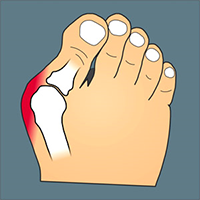 It is often believed that bunions and other various foot ailments occur because of ill fitting or unsupportive shoes such as high heels. However, information gathered by the Framingham Foot Study, led by Dr. Marian Hannan, suggests that certain foot problems are more likely to occur due to genetics in Caucasian men and in women of European descent. The study included 1,370 participants with an average age of 66 years and nearly 57% females involved. From 2002 and 2008, foot exams were conducted to verify foot deformities, hallux valgus, plantar soft tissue atrophy, and genetic analyses were estimated. The results concluded that bunions and other toe deformities were found to be highly hereditary while plantar soft tissue atrophy did not produce significant numbers. “These new findings highlight the importance of furthering our understanding of what causes greater susceptibility to these foot conditions, as knowing more about the pathway may ultimately lead to early prevention or early treatment,” stated Dr. Hannan.
It is often believed that bunions and other various foot ailments occur because of ill fitting or unsupportive shoes such as high heels. However, information gathered by the Framingham Foot Study, led by Dr. Marian Hannan, suggests that certain foot problems are more likely to occur due to genetics in Caucasian men and in women of European descent. The study included 1,370 participants with an average age of 66 years and nearly 57% females involved. From 2002 and 2008, foot exams were conducted to verify foot deformities, hallux valgus, plantar soft tissue atrophy, and genetic analyses were estimated. The results concluded that bunions and other toe deformities were found to be highly hereditary while plantar soft tissue atrophy did not produce significant numbers. “These new findings highlight the importance of furthering our understanding of what causes greater susceptibility to these foot conditions, as knowing more about the pathway may ultimately lead to early prevention or early treatment,” stated Dr. Hannan.
If you are suffering from bunion pain, consider treatment as soon as possible to avoid extended discomfort. For more information about bunion treatments, consult with one of our podiatrists of New York Foot and Ankle. Our doctors will attend to all of your foot and ankle needs.
What is a Bunion?
A bunion is formed of swollen tissue or an enlargement of boney growth, usually located at the base joint of the toe that connects to the foot. The swelling occurs by the bones in the big toe shifting inward, which impacts the other toes of the foot. This causes the area around the base of the big toe to become inflamed and painful.
Why do Bunions Form?
- Genetics – susceptibility to bunions are often hereditary
- Stress on the feet – poorly fitted and uncomfortable footwear that places stress on feet, such as heels, can cause bunions to form
How are Bunions Diagnosed?
Doctors often perform two tests – blood tests and x-rays – when trying to diagnose bunions, especially in the early stages of development. Blood tests help determine if the foot pain is being caused by something else, such as arthritis, while x-rays provide a clear picture of your bone structure to your doctor.
How are Bunions Treated?
- Refrain from wearing heels or similar shoes that cause discomfort
- Select wider shoes that can provide more comfort and reduce pain
- Anti-inflammatory and pain management drugs
- Orthotics or foot inserts
- Surgery
If you have any questions, please feel free to contact our offices located in Franklin Square and Bethpage, NJ. We offer the newest diagnostic and treatment technologies for all your foot and ankle needs.
